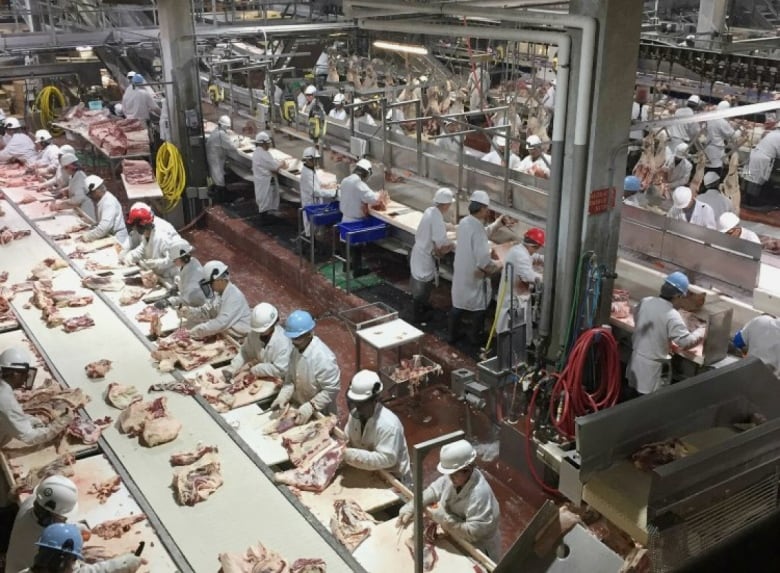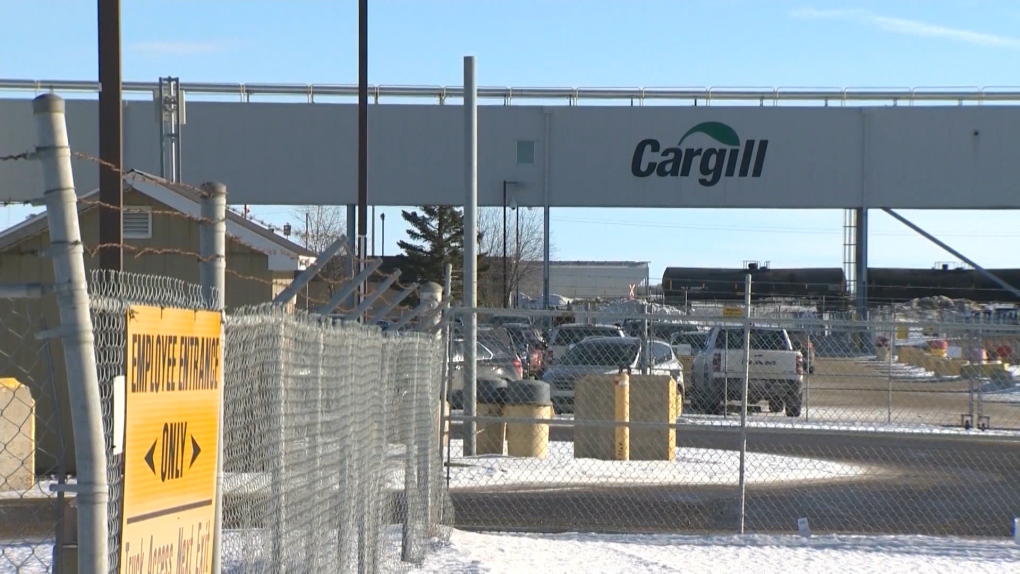This spring, members looking to reform the United Food and Commercial Workers filed a lawsuit against their union, the fifth largest in the country. The members hope that the case will result in changes that help democratize the UFCW.
By Lisa Xu

Delegates from United Food and Commercial Workers Local 3000 (Washington, Oregon and Idaho) get ready to head into union's convention in Las Vegas and hand out literature in support of a slate of constitutional amendments to increase bargaining power and democracy in the union. Their shirts bear the slogan "Organizing & Bargaining & the Right to Strike & A Voice in Our Union." Image via Labor Notes
Members seeking to transform the United Food and Commercial Workers (UFCW) have added a new weapon to their arsenal: legal action.
Grocery workers Kyong Barry (Local 3000 in Washington) and Iris Scott (Local 1459 in Massachusetts) sued the UFCW on April 19 over the undemocratic representation of members at the UFCW convention, which takes place every five years.
There are several charges, but the crux of the lawsuit is that delegates are apportioned across locals in such a way as to deny members an equal voice. A favorable ruling would enable reformers in other unions to sue on the same basis.
The UFCW is the fifth-largest union in the United States after the National Education Association (NEA), the Service Employees International Union (SEIU), the American Federation of State, County, and Municipal Employees (AFSCME), and the Teamsters. It represents 1.2 million members, who are largely in grocery, meatpacking, retail, and health care. As in most large unions, the convention is its highest governing body. There, delegates from each local elect the top officers and vote on changes to the constitution and the direction of the union every five years.
Union Democracy Law
The Labor Management Reporting and Disclosure Act of 1959 (LMRDA) is the main law governing union democracy in the United States, and union members like Barry and Scott have legal standing to sue under Title I, also known as the Members’ Bill of Rights.
Their lawsuit charges the UFCW with violating the LMRDA in four ways:Using a formula that disproportionately and unequally allocates delegates across locals. In the UFCW, members from larger locals are underrepresented relative to those from smaller locals. For example, a local with one thousand members is allocated two delegates (0.20 percent), while a local with fifty-five thousand members is allocated thirty delegates (0.05 percent), a fourfold difference.
Ex officio delegates serving in preference to elected delegates. In each local, the union president and secretary-treasurer are automatically delegates, reducing the fraction of the delegation selected through elections in which rank-and-file members may run. In smaller locals with two or fewer delegates, there are no separate delegate elections.
Allowing locals not to hold delegate elections, as well as to refuse to send elected delegates to the convention. The UFCW does not prevent local officers from deciding not to hold delegate elections at all, or refusing to send delegates once they are elected, usually citing financial reasons.
Allowing locals to give inadequate notice of delegate elections. The UFCW does not ensure that locals inform members of delegate nominations and elections.
If the lawsuit succeeds, members of other unions with similar complaints might successfully sue their unions (and likely recoup the cost of their legal fees as well). SEIU, for instance, also uses ex officio selection of delegates. Unfair delegate systems in major unions have been criticized as an obstacle to change.
Notably, the UFCW does qznot have direct elections for its top officers, also known as “one member, one vote” (1M1V). Barry and Scott are not necessarily calling for 1M1V as a remedy, and the court is unlikely to impose 1M1V when it rules on the case, due to the weakness of the LMRDA. However, direct elections are an important goal for UFCW reformers, and more equal representation would make it easier to pass 1M1V as well as other reforms at a future UFCW convention.
For the UFCW, winning 1M1V would mark a return to the union’s roots. Members of the former Retail Clerks International Association, which merged with the Amalgamated Meat Cutters to form the UFCW in 1979, had the right to vote for their top officers. The Teamsters and the United Auto Workers (UAW) both have 1M1V for top officers.
Sleeping Giant
The lawsuit is funded by Essential Workers for Democracy (EWD), which hopes to build the UFCW into a more democratic and fighting union and, as EWD puts it on its website, reawaken “the sleeping union giant.” Barry is on EWD’s board, and Scott began organizing with the group shortly after it formed in 2023.
Both were elected delegates at the 2023 UFCW convention, and helped put forward a set of pro-democracy and pro-organizing resolutions, including for 1M1V, coordinated bargaining, making it easier for locals to authorize a strike and improving strike benefits, more resources for new organizing, and capping union salaries at $250,000 a year. One resolution called for a more equal allocation of delegates, the subject of the current lawsuit.
However, most delegates ended up voting against these resolutions, siding with the current leadership, which vigorously opposed them. In at least one case, supporters of the status quo prematurely cut off debate to prevent rank-and-file members in line to speak in support of 1M1V from getting to the microphone. The Constitution Committee, whose role is to vet submitted amendments, also issued recommendations in near-perfect lockstep with UFCW leadership.
Reformers view the lawsuit as a continuation of their efforts at the convention and useful for continuing to agitate the rank and file. “For me, it was important to be involved with this lawsuit because I was at the convention, and I saw our rank-and-file voices being purposely suppressed,” said Scott, who is a steward and shift leader in produce at River Valley Co-op in Easthampton, Massachusetts.
“I understand that the vast majority of my union siblings, the over one million union siblings in the UFCW, haven’t had the experience to see that. . . . Although there are many ways for us to go about creating change, this is one route we realized we could use.”
Since the convention, EWD activists have also been focused on organizing in their workplaces around their flagship issues of coordinated bargaining, strike readiness, and democratizing the union.
They are building up local committees of reform-minded members, beyond the existing base that supported the EWD resolutions at the convention, and mapping key information such as the many units and contract expiration dates in each local. This is no small task in locals with tens of thousands of members, often spread across hundreds of grocery stores, meatpacking plants, and other workplaces.
This organizing received a boost at the 2024 Labor Notes Conference in Chicago, which fifty EWD activists attended together; many were meeting each other in person for the first time. Since the conference, EWD has begun holding virtual organizing trainings as well. The lawsuit itself was announced at a press conference during the conference weekend, with a roomful of UFCW members along with UAW and Teamster reformers.
On May 24, the UFCW responded by filing a motion to dismiss the lawsuit, arguing that the plaintiffs lack standing to pursue claims pertaining to the next convention, which will “occur years in the future” (in 2028), and that the harms alleged to them as members are “speculative.” If the lawsuit proceeds, a ruling is expected in late 2024 or early 2025.
The UFCW administration has also signaled that it is ready to retaliate against lawsuit supporters. In a notice sent to all local union presidents in May, President Marc Perrone demanded “respect” for the international union and suggested that a “third party” was undermining it, presumably a reference to EWD.
UFCW at a Crossroads
The union’s reform wing has been gaining steam.
Among the most important initiatives is coordinated bargaining among locals representing Kroger workers, led by Faye Guenther, the president of Local 3000, the union’s largest local. A major effort in 2022 pooled resources across eight West Coast UFCW locals and took on contracts covering one hundred thousand grocery workers. Coordinated bargaining is also one of EWD’s leading demands, as the UFCW has no master grocery contract and agreements are fractured across hundreds of locals.
Local 3000 has also anchored a Stop the Merger coalition of UFCW locals (and one Teamsters local) aimed at halting the megamerger of grocers Kroger and Albertsons. The coalition’s efforts led to the Federal Trade Commission filing for an injunction in February in an attempt to prevent the deal from going forward.
The proposed merger would be the largest in supermarket history and pit the UFCW against even greater consolidated corporate power across the bargaining table.
Another area in which reformers agree the union is falling short is new organizing, which is under-resourced and where the UFCW’s lackluster reputation also often precedes it. Scott pointed to workers at Trader Joe’s and Amazon not wanting to organize with the union, and said, “At a certain point we have to look in the mirror and ask why.”
“[The lawsuit] is a tool to show that you can still love your union and also fight to hold it accountable to the members,” Scott said. “You can use it to reach workers that have never heard about any of this going on within their unions, and to pull them into this movement.”





